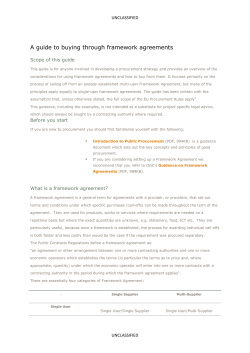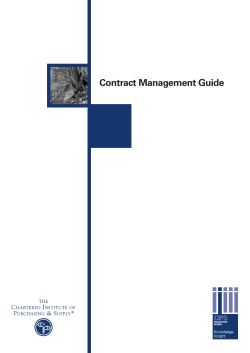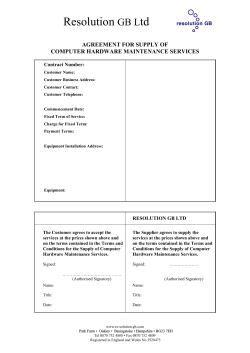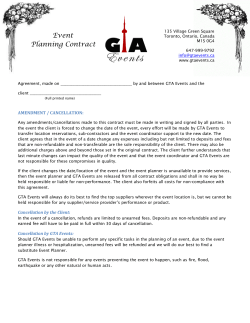
Framework Arrangements
Framework Arrangements CIPS is expressing beliefs on framework arrangements as they are a fundamental part of managing the supply of goods and services, yet are often a source of confusion organisation so it is important to first ensure that the terms and conditions are correctly drafted so that the supplier is tied in to what has been agreed. Consideration is of course Framework arrangements are becoming more popular as an essential element of the contract; without consideration, they represent a 'smarter' way of purchasing than placing 'one-off' orders for recurrent contracts for works or supplies; either party may withdraw at any time. The consideration by, for example, optimising volume purchasing discounts and may be a purely nominal sum which will, however, in the event of a dispute, normally be interpreted by the courts as minimising repetitive purchasing tasks. confirmation that the parties are happy to be bound in the legal sense (see section below headed 'Consideration'). A key aim of a framework arrangement should be to establish a pricing structure; however this does not mean that actual prices should be fixed but rather that there should be a Other expressions associated with framework contracts include 'term contracts' which are generally framework mechanism that will be applied to pricing particular contracts, but may also be encountered in other buyer/ requirements during the period of the framework. It should supplier situations and are arrangements put in place for a also be possible to establish the scope and types of goods/ fixed period of time. These are sometimes referred to as services that will need to be called-off. 'period contracts'. Where a contract of this kind is put in place without a specified end date it is sometimes called a CIPS Positions on Practice 'running contract' or 'perpetual contract'. Introduction The key positions in this paper are summarised below. • CIPS emphasises the importance of buyers making a distinction between framework agreements and framework contracts. • Buyers need to be aware of the various expressions associated with framework arrangements, including 'trading agreements' and 'standing offers'. • CIPS believes that since, by definition, framework arrangements extend over a period of time, particular care has to be given to setting prices (consideration) when at the contract stage. • CIPS would emphasise that lengths of call-offs are not governed solely by EC rules - they are also of significance for medium- and long-term consultancy contracts, for example. • CIPS believes that the purchasing professional has a responsibility to select the type of framework best suited to his organisation's needs. • CIPS considers that when putting framework arrangements in place purchasing professionals should communicate the implications to colleagues both within and external to the organisation. • CIPS believes that buyers need to pay particular attention to the supplier base (geographical distribution, for example) when putting framework arrangements in place. Framework Agreement A framework agreement is the same arrangement without the up-front consideration - instead, each time a buyer uses the agreement a separate contract is formed by the consideration paid for the order in question. Some organisations call framework agreements 'trading agreements' - others might call them 'standing offers'. 'Blanket orders' are a type of framework agreement (they can also be a commitment of any of the purchasing participants to make use of the arrangement but under the terms of which they are entitled to obtain the specified goods or services from the participating suppliers should they wish to do so). In blanket order situations an order number is given to a supplier which the supplier uses to invoice - and buyers simply call off their requirements against it. Many other terms are used for framework agreements, one example being 'umbrella agreements'. The term 'frames' is also used but is rather unfortunate in that it has negative connotations! There are broadly two types of framework arrangements framework contracts and framework agreements. Therefore, difference between framework contracts and framework agreements may be summarised by saying that the former is an arrangement between two parties which commits one to buying at least a certain volume of particular goods or services from the other over a specified period; the latter is an agreement between two parties for the supply of an unspecified amount of a product over a specified period. In this document, for points that apply equally to a framework contract or framework agreement, the generic term 'framework arrangement' is used to include both. A 'memorandum of understanding' is also an expression used in association with, or as a type of, framework arrangement. Framework Contract Consideration A framework contract has a consideration of a monetary sum paid up front by the buying organisation to the supplier. This payment is made in order to create a contract on the terms and conditions offered by the supplier to the buying Consideration is almost always a sum of money; however, since consideration may be concisely defined in a contractual context as 'something of value', goods or services can also constitute consideration. Definitions Tel +44(0)1780 756777 • Fax +44(0)1780 751610 • Email ckw@cips.org • Web www.cips.org Framework Arrangements Opinions differ as to whether or not nominal amounts such as £1 represents consideration under a framework arrangement; in the civil service and MOD, for example, such a sum is deemed to be acceptable consideration. An opposing view is that if the parties commit themselves then there is a contract - paying £1 will not make any difference. In many cases buyers will not be able to accurately forecast their requirements; however this does not obviate the need for some form of contractual commitment. Generally the reality is that buyers are disinclined to commit themselves when, as is often the case, future needs are unclear; this is a particular issue when larger value items are involved. The attractiveness of the £1 consideration is that it should ensure the supplier keeps his offer open for acceptance without the buyer being committed to a specific level of expenditure. On the other hand it may be difficult to imagine that a supplier would accept a commitment to satisfy any and every order in return for no client commitment to place any orders at all or at least would require much more than £1 for doing so. An alternative approach is the 'total support concept' this functions rather like an extended consumer warranty, whereby, for a payment of £X per month a supplier will undertake to supply all the spares and repairs needed. place. The length of call-offs under a framework arrangement is not limited by the EC Procurement Directives (see next heading). For example, call-offs for consultancy services might be for three, six or 12 months or even longer. However, individual call-offs should not be affected just to circumvent EC rules. Thus it would be difficult to justify a 12-month call off right near the end of the term of the framework in cases where the normal pattern hitherto has been for one-month call-offs. Options for call-off arrangements will vary according to individual circumstances and in particular the number of suppliers involved. Framework Agreements and the EC Procurement Rules In the EU, buyers in the public and utilities sectors must comply with the EC Procurement Directives. The Directives do not mention framework arrangements of any kind yet it is common practice in the UK for both public and utilities sector buyers to put such arrangements in place. Indeed, well over 80% of public sector orders are put through framework arrangements. (Note: The new consolidated Public Procurement Directive (currently - June 2003 - in its final stages in Brussels) does Terms and Conditions for the first time explicitly address the issue of framework agreements. This gives important clarification to the way Some organisations set up framework arrangements by bodies subject to the EC rules must let and operate sending stringent terms and conditions to suppliers as part framework agreements and introduces certain new of the invitation to tender documentation, and in order to be requirements including the restriction of the length of a awarded the framework arrangement they have to agree to framework agreement to four years except in exceptional the terms and conditions proposed. On other occasions circumstances. Comprehensive guidance is available from 'boiler plate' conditions of contract are sent to suppliers the OGC website (www.ogc.gov.uk). which are modified under the contract that comes into being later, for example, when a call-off order is made. The Public Sector The terms and conditions agreed at today's date will apply even if delivery and hence payment is a year down the line; the original framework document needs to reflect/ accommodate this. The framework is the main contract, with each individual order constituting a separate mini-contract. Within the public sector, there are two types of framework arrangements that are commonly used. The first is where an arrangement is put in place with one or more suppliers for the supply of a range of supplies or services in which the prices (or more accurately, a pricing formula) and terms and conditions are all agreed for the duration of the period of the The contract needs some form of disclaimer to the effect arrangement. The second type is where prices are that any estimates of volume of demand are non-binding, determined by a 'mini-competition' between the suppliers and even that the buyer is not obliged to place any orders at that have been awarded the framework contract; they can all. Also that the buyer has the right to place orders for the also be used to refine other value for money criteria same goods and services elsewhere during the lifetime of the However, the award criteria must remain consistent with agreement. those employed at the time the arrangements were put in place. Both types of arrangement can be let with a single Framework arrangements can also be used simply to presource supplier but the 'mini-competition' stage in the agree one or two terms or conditions that the parties agree second type of arrangement involves the supplier firming up will provide the basis of a trading arrangement if suitable the prices for the requirement in question. opportunities arise in the future. Here it is important that all the buyers who might be dealing with that supplier are made Alternatively, it can be argued that rather than two different aware of the arrangement so as to avoid unnecessary debate. types of framework arrangement there are instead two Thus a buyer might confirm acceptability of the supplier's different ways of calling off from any given framework buyers standard terms so they do not have to be rearrangement. Whether or not a mini-competition is held negotiated every time. depends on the particular requirement and whether the Call-Offs When awarding call-offs (i.e. individual contracts) under framework arrangements, contracting authorities in the public and utilities sectors do not need to go through the procedural steps again as long as the rules for setting up the framework agreement were correctly observed in the first terms are precise enough to identify the best supplier for that particular requirement. The Utilities Sector The separate Utilities Directive provides for framework agreements, defined as “an agreement with suppliers, the Tel +44(0)1780 756777 • Fax +44(0)1780 751610 • Email ckw@cips.org • Web www.cips.org Framework Arrangements purpose of which is to establish the terms governing contracts to be awarded during a given period, particularly in terms of price and quantity” (this could be used as a generic definition for framework agreements). For this type of agreement there is no particular problem under EC rules as it can be treated in the same way as any other contract. However, the Commission is concerned that there should be no potential for negotiation or varying the contract when calling off a requirement against a framework - finalising the terms of any contract under a framework should be a 'mechanistic' procedure, not involving re-negotiation of the terms already established. The UK has always taken the view that the only sensible approach to such arrangements is to treat them as if they are contracts in their own right for the purposes of the application of EC rules. As such the practice has been to advertise the framework itself in OJEU and follow those rules for the selection and award of the framework. Framework arrangements are most often used for high volume/low value orders but are also useful for other segments of spend such as consultancy arrangements. They are particularly useful in construction projects as they enable detailed specifications to be worked up at an appropriate time within the project. They are also a useful tool in the bid support arena to generically underpin a future contract that will not be agreed unless the specific bid is won. The Portfolio Matrix can be used to illustrate the different ways framework arrangements can be used, for example, in the 'Leverage segment' it is good practice to aggregate spend but limit the duration of the arrangement and/or have other mechanisms built in to maintain competition. In the 'critical segment' a more detailed term contract may be appropriate' to ensure security of supply. In the 'strategic segment' a framework may be more akin to a partnering agreement and seek to try to extract extra added value services from the supplier relative to the buying organisation's competitors. Drawing up Framework Arrangements Variations in Framework Arrangements, and in Their Uses The following examples illustrate some of the variations in framework arrangements, and the purposes they can serve. Setting up framework agreements and framework contracts should not be seen as an onerous process. They should usually include: • some words that describe the purpose and scope of the It is the role of the purchasing and supply management arrangement professional to determine the type of framework arrangement to support the organisation's needs according to • clarity on whether it is in fact a contract or agreement (i.e. circumstances. For example, if a supply requirement is from is there consideration) a supply chain with risks associated with it then it is probably • terms and conditions that apply to each call-off (an best to firm up the arrangement by making it into a contract. identified arbiter is also useful) • a pricing mechanism - may not be fixed prices along with Some organisations provide an estimated quantity without discount arrangements any commitment to meet that quantity when setting up framework arrangements, with the aim of achieving better • specifications, standards, samples as appropriate to define value for money; this will be improved where a quantity is the requirements actually committed. When details of quantities are provided • a call-off mechanism/procedure these should not be exaggerated, as this will undermine the • period - duration of arrangement credibility of the buying organisation in the supply market. • any limitations on the use of the arrangement Equally, if a framework arrangement is put in place that is not used, then this too will damage the buying organisation's • estimated volumes as appropriate. credibility. A deed is another legal device that can be used to tie the supplier in to the terms and conditions offered, as it is a means of creating a contract without consideration. This, however, can be an expensive process involving lawyers and, as such, it is not recommended by CIPS. Suppliers who are awarded framework arrangements are sometimes termed 'approved suppliers' or 'preferred suppliers' as they have been subject to a supplier appraisal process and therefore considered to offer value for money from a relatively secure source. The expression 'qualified list' of suppliers is also used when referring to suppliers who have been awarded framework arrangements. It is arguable that a distinction may be made between approved and preferred suppliers. One pair of definitions might be: • an approved supplier is one on a list of similar suppliers who has been pre-qualified and is eligible to tender or quote for particular categories of requirement • a preferred supplier (a dangerously nebulous term) is one who has some kind of formal agreement with the organisation. One way of avoiding possible confusion is to simply use the term 'contracted supplier'. Advantages of Framework Arrangements Framework arrangements can provide many benefits to the buying organisation including: • flexibility -to determine the specific requirement at the calloff order stage • saving time at a critical stage in a project, as the buyer can firm up the requirement at the appropriate time and simply call-off rather than having to go through a competitive exercise that could cause unnecessary delays to a project • leverage/economies of scale through aggregation framework agreements and framework contracts can often cover hundreds of items with the prices and terms and conditions agreed • avoids duplication - one buyer goes out to the marketplace on behalf of all the other buyers in the organisation • avoids re-work -as framework agreements/contracts can be used to remove the need for requisitions and approval processes (as the risk has already been managed) - however some organisations prefer to use the full acquisition procedure, even for call-off orders • a suitable method of conducting business in an organisation that has devolved budgets - by putting arrangements in place and then empowering end-users to order from them Tel +44(0)1780 756777 • Fax +44(0)1780 751610 • Email ckw@cips.org • Web www.cips.org Framework Arrangements • an appropriate method for use by consortia that set up arrangements on behalf of a number of organisations as it provides leverage through economies of scale whilst maintaining the independence of the buying organisations • enabling eProcurement by putting the suppliers' offerings under the framework arrangement on the eProcurement system for buyers to use • supporting purchasing cards as buyers can call off from the framework arrangements using pCards for ordering and payment • can be used as a method of variety control/standardisation as appropriate by offering buyers only the choice of products within a category of spend which are provided for under the framework arrangements in place -alternatively the converse can be enabled through frameworks offering buyers a wider choice than they would have the time to arrange if sourcing independently. Introducing Framework Arrangements Practical Considerations It is important that the purchasing and supply management professionals who put a framework agreement/contract in place for use by other buyers (either colleagues, or those in other organisations) ensure they communicate the fact that this has been put in place and provide these individuals with easy access to the arrangements. This might be done via an intranet or part of an eProcurement solution with suppliers' offerings under the framework arrangements being readily accessible and usable. Suppliers are also helpful in promoting the framework arrangement to buyers and end-users by, for example, putting on lunchtime presentations explaining the new arrangement and taking questions. Another consideration is ensuring that buyers and end-users understand the circumstances in which they should use the framework arrangements. This must be articulated as part of the policies, procedures and standing orders of an organisation that empower specified individuals to carry out certain activities within an overall policy framework. An example might be for an end-user to commit a £100k order to a supplier that happens to be a preferred supplier under a framework arrangement for a given set of requirements whereas it would have been preferable to put the order out to competition. be made to the CIPS Knowledge Summary document on Contract Management.) For this purpose, when initiating or re-letting such arrangements, there must be clear definition of the management information and analysis which will be required, e.g. regarding frequency/value/types of goods and services called off, and delivery performance; and which party will capture it. Often, the supplier is in the best position to do this. As well as receiving such reports in hard copy, the customer will benefit from receiving them in digital form e.g. Excel files, enabling them, if necessary, to analyse the data in additional ways. Purchasing and supply management professionals must also ensure that they manage a market so that the competition does not disappear as a result of all the business being placed with just one or two suppliers. This is particularly important when setting up framework arrangements on behalf of a large organisation, or on behalf of a consortium. When considering how many suppliers to award a framework arrangement to for a given requirement, the issue of geographical spread needs to be considered. For instance, one supplier might be best placed to service sites in the North East of England and not be as capable of servicing sites in Devon or Cornwall. One method is to enable a supplier to subcontract work to another local supplier to cover the area that is difficult for the main contractor to service. In some public sector organisations, multiple framework arrangements are put in place at national, regional and local levels. Care needs to be taken to communicate to end-users and buyers which arrangement offers best value for money to the organisation especially if one supplier is servicing two arrangements - at a national and local level, for example. All frameworks when tendered should clearly show that it is indeed a framework arrangement; the duration of such arrangement; the estimated maximum number of suppliers; estimated total value; and the award criteria, whether simply price, or MEAT (Most Economically Advantageous Tender). Conclusion This CIPS Position has drawn attention to the expression 'framework arrangement' as a convenient generic term embracing 'framework agreement' and 'framework contract' A further related point is that end-users and buyers using the although given the visual similarity of the words framework arrangements must be aware of the importance of 'arrangements' and 'agreements' the choice of word is perhaps confidentiality - and not for example, communicate prices to not ideal. other suppliers in the marketplace. It is also good practice to This Position has clearly shown that while framework involve a representation from the user community when setting up the framework arrangement so that their needs are agreements are an essential feature of the landscape for those working in the public sector and with the EC included in the decision-making process and hence they are Public Procurement Directives, and are moreover frequently more likely to use and support the arrangement. mentioned in the literature, they have not until now featured in the Public Procurement Directives themselves (a situation It is important to note also that a framework arrangement which, however, is likely to change when the new should be tailored for the type of requirement being contemplated e.g. that relating to short-notice plant hire will consolidated Public Procurement Directive is published). be very different to those applicable to major project work. In its review of framework contracts this Position has drawn attention to the vital role of consideration in contracts. Monitoring Framework Arrangements Referring to the discussion of nominal consideration, CIPS takes the view that suggesting a sum of £1 might cause All arrangements with suppliers need to be managed once resentment in some suppliers. Setting firm prices at the they have been put in place, by seeking end-users' and buyers' contract stage also has its dangers; a much better approach, feedback, as well as through feedback from the suppliers. suggested towards the bottom of the first page, is to make Performance measurement is important and should be use of a mechanism that can be applied to pricing particular aligned to the award criteria and the scope and purpose of the requirements during the period of the framework. arrangement. Reviews should be undertaken regularly within a framework of continuous improvement. (Reference should Tel +44(0)1780 756777 • Fax +44(0)1780 751610 • Email ckw@cips.org • Web www.cips.org
© Copyright 2025




















